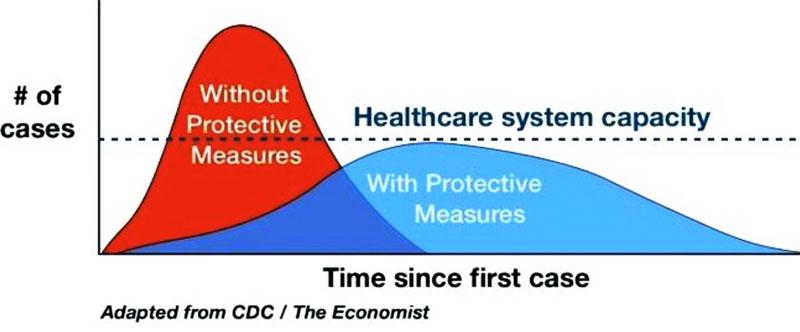The most important hashtag for the next month or so may be #FlattenTheCurve
You may already have seen the simple graphic below (this version was designed by Drew Harris), but if you haven't, here it is: #FlattenTheCurve.
This one, simple graphic instantly explains everything you need to understand about why "social distancing", including the massive cancellations of practically every large (or even medium-sized) public event is happening at a frighteningly fast rate even as I'm typing this.
The NBA? Shut down. Broadway? Shut down. The Capitol? Closed to the public. Entire school districts? Being closed left and right (including our own).
None of this will do anything to prevent #COVID-19 from spreading across the world or the U.S.--cases have already been confirmed in every state except Alaska, Alabama, Idaho and West Virginia as of this writing, and I'm sure it's only a matter of time before they're added to the list as well. It likely won't even do anything to reduce the total number of people who are exposed to and/or infected by the virus--for instance, German Chancellor Angela Merkel predicts that 60-70% of her country will be infected at some point or another.
What it can do is slow down the spread, which buys time for everything from producing enough tests to developing and testing a vaccine...but most importantly, to preventing the surge in coronavirus cases from completely overwhelming our healthcare system's capacity for handling the growing number of patients:
There's a bunch of explainers out there so I'm not gonna try to write up my own (especially as I'm not a doctor or infectious disease expert), but I like this one (out of New Zealand, of all places) in particular, so I'll crib from it a bit...make sure to read the whole thing, though:
Flattening the curve
Our aim will be to keep phase two of the epidemic curve as flat as possible, keeping the number of cases reported each day as low as we can. If we can achieve that, it’ll mean we’ll be able to treat everyone who needs treating. We can all help with this by washing our hands regularly, avoiding touching our mouth, nose, and eyes, and staying away from other people when we are sick. This also means calling ahead if you feel sick and want to go to the doctor or hospital. The last thing we need is loads of our healthcare workers in isolation because they’ve been exposed to Covid-19. Forty-five staff from North Shore Hospital have been isolated as a precaution because of a probable case.
Another thing we are all going to need to start doing soon is minimising or avoiding contact with other people. This is called social distancing. If you are greeting people, don’t hug, shake hands, hongi, or kiss. Bump elbows or feet instead. Work from home if you can. Much as it pains me to say it, social distancing also means avoiding public transport (get on your bicycle!). Similarly, it means avoiding gyms, churches, cinemas, concerts, and other events and places where people congregate. At the community level we may need to close schools, universities, museums, and workplaces, limit public transportation, and cancel public events. This is what China did so effectively and what Italy is currently implementing in some regions.
As it happens, my wife and I already work out of our home anyway, and we don't really do much in the way of travelling. Frankly, we don't do enough in the way of having a social life with friends & family...which we were ironically planning on changing right around the time the coronavirus pandemic hit anyway. So now we're gonna be homebodies for awhile whether we like it or not.
For millions of people, of course, "work from home" simply isn't an option...and all the essential things needed to go into Cabin Fever mode require a whole lot of people who can't necessarily work at home: Food, drink, water, electricity, heat, sanitation, internet, etc etc. I'm aware of how relatively lucky we are and I appreciate that.
Look out for each other and stay well. Let's hope we get through the next few weeks (?) mostly intact...




